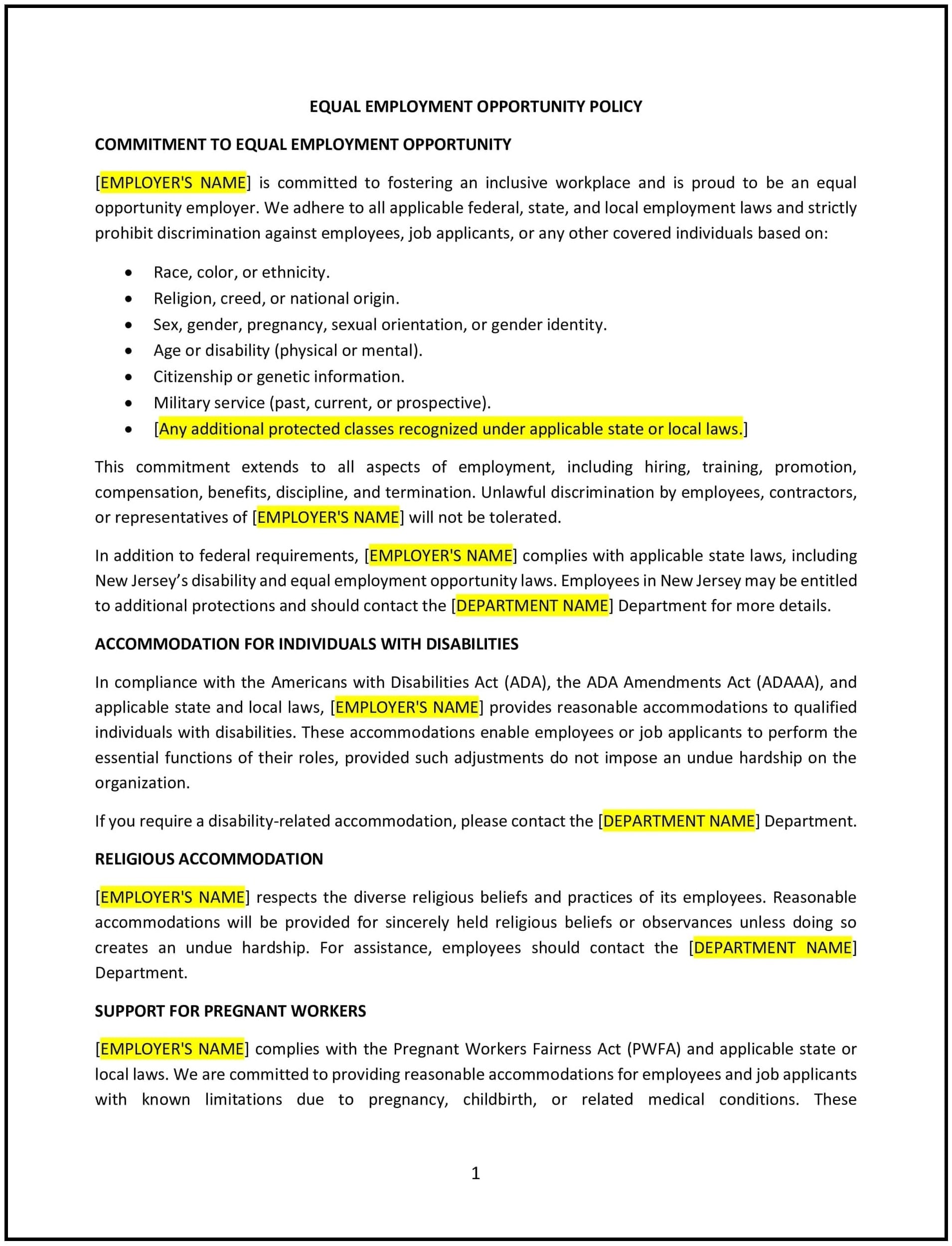Equal employment opportunity policy (New Jersey): Free template
Got contracts to review? While you're here for policies, let Cobrief make contract review effortless—start your free review now.

Customize this template for free
Equal employment opportunity policy (New Jersey)
An equal employment opportunity (EEO) policy helps New Jersey businesses create a fair and inclusive workplace by promoting non-discriminatory hiring, advancement, and employment practices. This policy outlines the company’s commitment to providing equal opportunities regardless of race, gender, age, disability, religion, or other protected characteristics. It also sets expectations for fair treatment, reporting discrimination, and fostering a respectful work environment.
By adopting this policy, businesses in New Jersey can attract diverse talent, promote workplace equity, and reduce discriminatory practices.
How to use this equal employment opportunity policy (New Jersey)
- Define equal employment opportunity: State that hiring, promotions, and other employment decisions will be based on merit, qualifications, and business needs.
- Identify protected characteristics: Specify that employees and applicants will not be discriminated against based on race, color, age, gender, disability, religion, national origin, pregnancy, marital status, sexual orientation, or other legally recognized categories.
- Promote fair hiring practices: Ensure job descriptions, interviews, and promotions are conducted without bias or preferential treatment.
- Address workplace discrimination and harassment: Prohibit discriminatory behavior and provide guidelines for addressing concerns.
- Establish reporting procedures: Provide employees with multiple channels for reporting discrimination, such as HR, an anonymous hotline, or direct supervisors.
- Encourage inclusivity in company culture: Support diversity initiatives, employee resource groups, and training programs that foster inclusion.
- Maintain confidentiality in complaints: Assure employees that reports will be handled discreetly and investigated fairly.
- Review and update: Regularly assess the policy to reflect changes in state laws, business needs, and best practices in workplace inclusion.
Benefits of using this equal employment opportunity policy (New Jersey)
This policy provides several benefits for New Jersey businesses:
- Promotes a fair workplace: Establishes clear expectations for equal treatment and merit-based decisions.
- Reduces legal risks: Helps businesses follow fair employment practices that align with state and federal regulations.
- Enhances diversity and inclusion: Encourages hiring and career development opportunities for a wide range of candidates.
- Improves employee morale: Reinforces a culture of fairness, respect, and opportunity.
- Attracts top talent: Appeals to job seekers who value inclusive and diverse workplaces.
Tips for using this equal employment opportunity policy (New Jersey)
- Communicate the policy clearly: Ensure employees and hiring managers understand EEO expectations.
- Train leadership on fair employment practices: Provide managers with tools to support diversity and prevent discrimination.
- Encourage diverse hiring strategies: Broaden recruitment efforts to attract a wide range of candidates.
- Address concerns promptly: Respond to complaints and concerns about discrimination or bias in a timely and fair manner.
- Review the policy regularly: Update the policy as workplace diversity initiatives evolve and New Jersey regulations change.